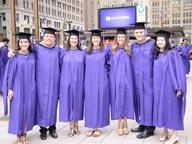Faculty News
—
Professor Nicholas Economides comments on the austerity measures recently approved in Greece
—

Excerpt from Bloomberg -- "'The Greek parliament approved significant increases in taxes and reductions in pensions, which are likely to intensify the recession, and also approved selling a large swath of state assets to partially pay for its debt,' said Nicholas Economides, professor at Stern School of Business at New York University. The IMF and the EU are too far apart on the issue of debt relief to converge by the May 24 Eurogroup meeting, Economides said, 'therefore the likely outcome is an approval of an installment of the EU part of the Greek loan with the IMF’s position to be clarified at a later time.'"
Faculty News
—

Excerpt from Bloomberg -- "'The Greek parliament approved significant increases in taxes and reductions in pensions, which are likely to intensify the recession, and also approved selling a large swath of state assets to partially pay for its debt,' said Nicholas Economides, professor at Stern School of Business at New York University. The IMF and the EU are too far apart on the issue of debt relief to converge by the May 24 Eurogroup meeting, Economides said, 'therefore the likely outcome is an approval of an installment of the EU part of the Greek loan with the IMF’s position to be clarified at a later time.'"





















